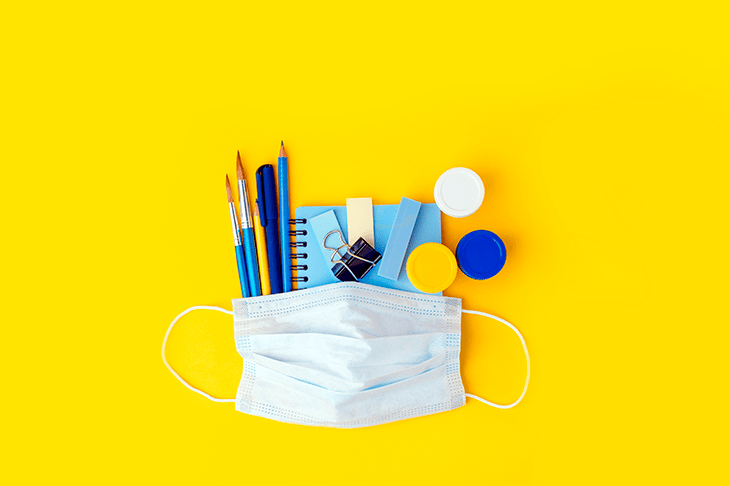Last summer, we joined the sharp-elbowed ‘exodus’ that saw demand for places at independent schools increase by up to 30 per cent. We were guilty, according to the Observer, of creating ‘an even larger divide between affluent and disadvantaged pupils’. Not to be out (middle) classed, we went one better, enrolling our 15-year-old daughter as a boarder. Home for the holidays, she so animatedly regaled us with her experiences that we might have smugly congratulated ourselves on our selfless financial sacrifice were it not for one qualification: ‘But I’d rather be here, with you.’
We’d never countenanced boarding. The derisory online provision of her state grammar throughout lockdown was a frustration, but while I railed at the shortcomings I clung to the hope that any adverse impact would be short-lived. The disadvantage to a bright, motivated child with a supportive home environment would probably be minimal and easily compensated for when she returned. It was mid-June when the penny dropped that she wasn’t going to get ‘face to face contact’ with her teachers before the summer and even a September return looked iffy — certainly if the reliably intransigent NEU had anything to do with it. If the disruption was set to continue and so impact upon GCSE preparation, we thought it might be an idea to move her somewhere less in thrall (seemingly) to the assertion of unions that live lessons breached teacher privacy.
At this juncture we might have happily waved her off to the Marshall Islands if it would have secured her a proper education
We were keen on a particular school that had established an impressive e-learning programme and whose Christian ethos stood in very alluring contrast to the fashionable ‘woke’ bilge that had been foisted upon her. It was, however, situated 300 miles away. Still, our daughter was thrilled with the prospect of boarding (too much Harry Potter?) and at this juncture I think we might have happily waved her off with a one-way ticket to the Marshall Islands if it would have secured her a proper education. We assessed we could commit financially to the next two years, which would see her through to sixth form. The offer of a music scholarship tipped the balance.
I didn’t sleep well for the rest of the summer. Though we’d long felt ambivalent at best towards her state school, she had settled friendships, was doing well academically and was in no way unhappy. It seemed a pretty big gamble. We kept these reservations to ourselves and instead amused her with faux chippy (well, faux up to a point; we both attended comprehensives) warnings about attitudes she might encounter. We teased that having hitherto been considered ‘posh’ she would now likely be regarded as the lowliest pleb. Indeed, she was later triumphant to be able to report that she’d been asked the name of her ‘first’ pony. Happily, she wasn’t ostracised for lacking one and was soon so busy enjoying activities ranging from raft-building to baking and campfire ‘socials’ that the calls home tailed off. The effort the school expended in fostering a sense of normality was remarkable. These fortunate kids might easily have forgotten that they were living through a pandemic.
Of course private schools have been advantaged in adjusting to Covid and not only financially: most often there are fewer pupils and more space. But nor should a can-do attitude be underestimated. It was made clear by many state schools last summer that presuming the return of all pupils in September, there would be nothing in the way of extra-curricular provision. No choir or orchestra. No drama. No inter-school sports matches. Our daughter had two in-person instrumental lessons a week, as well as playing in an orchestra and other music ensembles. Concerts have been performed and live-streamed for parents.
The precautions taken — distancing and the addition of a Perspex sheet for the music stands of wind and brass players — are surely not beyond the wit or budget of any school?
The government — somewhat belatedly — conceded it was not safe to reopen schools in January and, until this week, when they finally reopened, our daughter was once again isolated at the kitchen table. But, oh, what a difference. She logged in at 8.40 each morning and her timetable was replicated in full. With extra-curricular activities and assemblies also maintained, she was often still ‘in school’ past 5 p.m. The pastoral provision was equally superb. She had a one-to-one tutorial every week — a chance to raise any concerns, monitor her progress or simply to offload. Expectation was high. Pupils were encouraged to keep their cameras on so that the teacher could not only be sure they were there, but so as to better mimic a physical classroom experience. Likewise, they were asked questions and expected to engage with one another. This was not without its problems. I’d slept late one morning and absent-mindedly wandered past her workspace in my dressing gown, whereupon my husband greeted me with: ‘You’re not hungover again, are you?’ Yes, of course she had not been muted.
We had little to complain about in the circumstances. Our daughter — whom we had missed terribly — was back at home and receiving excellent teaching. Meanwhile, her viewpoint appeared to have shifted. After ten weeks of family board games, being hectored to tidy up after herself and expected to do her fair share of walking the dog — in short, ten weeks of us — she was moved to ask: ‘What’s the latest on schools, then? ’Cos I’d really like to go back now.’





Comments